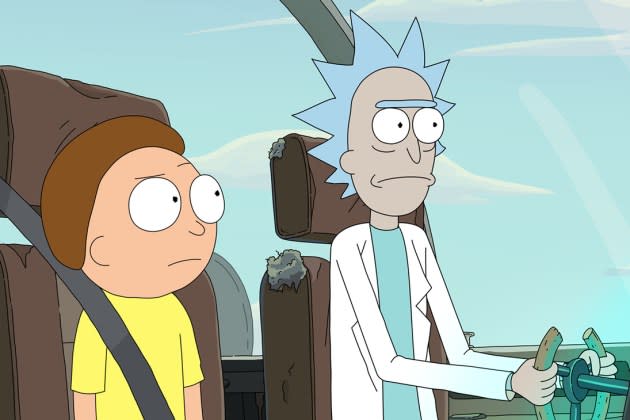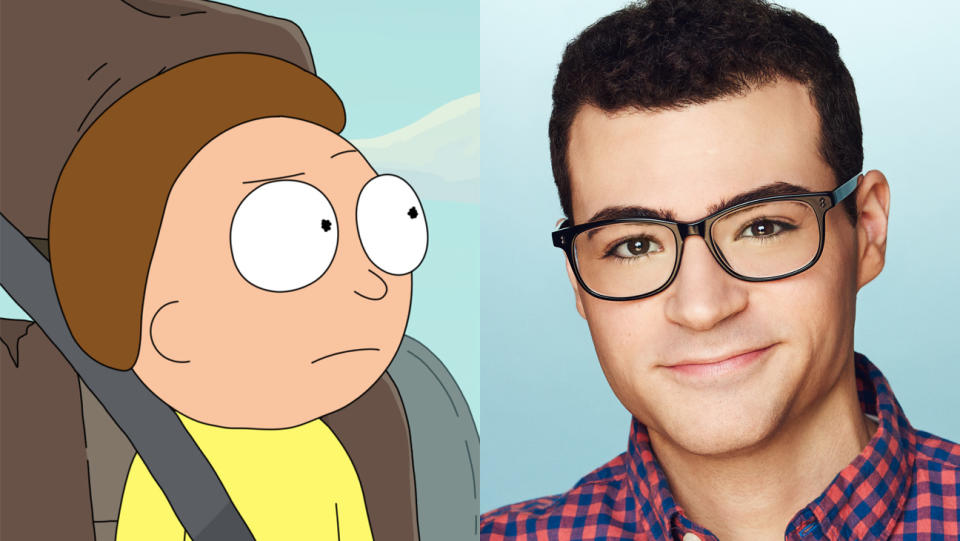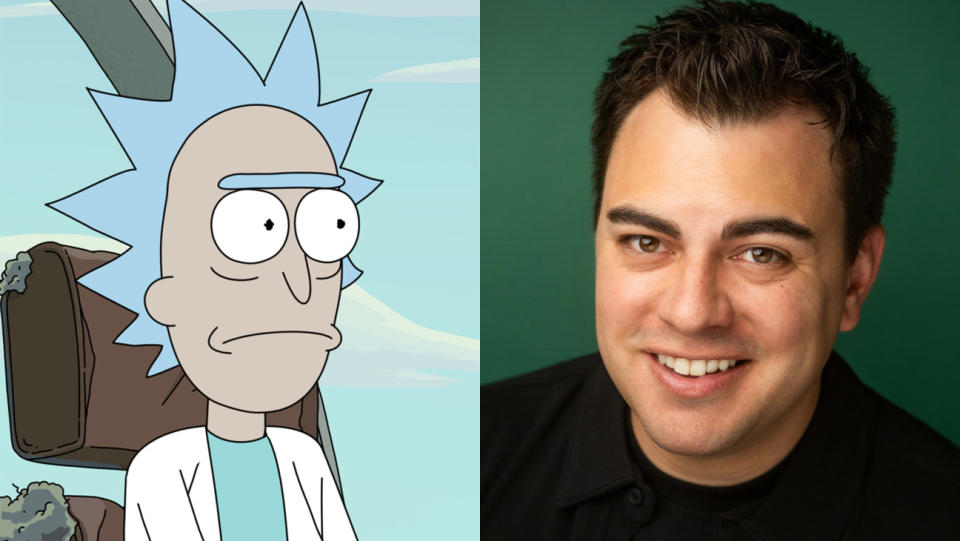How ‘Rick and Morty’ Cast Its New Voice Stars
- Oops!Something went wrong.Please try again later.
- Oops!Something went wrong.Please try again later.
- Oops!Something went wrong.Please try again later.

After a nearly six-month search that featured thousands of candidates, newcomers Ian Cardoni and Harry Belden now find themselves squarely in the spotlight after they officially made their debut as the voices of the narcissistic, alcoholic genius Rick (Ian Cardoni) and his bumbling grandson Morty (Harry Belden), respectively, in the season seven premiere of the Adult Swim animated hit.
Sunday’s premiere marked the first episode of Rick and Morty without co-creator Justin Roiland, who until now had voiced both characters (among others) for all of the show’s 61 previous episodes. Roiland was fired from the cult hit and saw his Hollywood empire implode after allegations of domestic violence surfaced and reports, including in The Hollywood Reporter, uncovered years of his allegedly troubling behavior. An Orange County District Attorney dismissed the domestic violence charges, citing insufficient evidence, and has also denied new allegations of misconduct that range from sexual harassment to sexual assault.
More from The Hollywood Reporter
Dan Harmon Gives Update on "Truly Terrifying" 'Community' Movie
Dan Harmon Is Ready to Talk About All of It (Including the Justin Roiland Drama)

For Rick and Morty showrunner Scott Marder, who led the casting search, the goal was clear: To make the change as seamless as possible so viewers — who knew about the behind-the-scenes drama as well as those who didn’t — couldn’t notice a difference in the two beloved characters. Marder and co-creator Dan Harmon both see the additions of Cardoni and Belden as a way to add years to the show’s lifespan after the decision was made to use two voices rather than one for both Rick and Morty.
Cardoni, a Boston-area native who graduated from Emerson College, appears in Larry David’s Clear History and also voices promos for Syfy drama Resident Alien, WWE and Apple TV+. Belden, who was born and raised in Chicago and graduated from the University of Illinois at Urbana-Champaign, attended the Second City Training Center and counts roles in Adult Swim’s Joe Pera Talks With You, Fox’s Proven Innocent and NBC’s Chicago Med. Neither actor is doing interviews as they honor the ongoing SAG-AFTRA strike.

Below, Harmon and Marder open up in an exclusive interview about finding Cardoni and Belden, how Rick and Morty may change with its new leads and if the show would ever take a shot at Roiland.
Walk me through the casting process, starting with the decision to cast two actors in roles as Rick and Morty after Roiland previously voiced both. Did you always want two different actors for the parts?
Scott Marder I did. There were different schools of thought. For sheer quality of life, it’d be easier for the amount of work required for both characters. We watched it over the years wear down on Roiland’s voice. It felt unfair to do that to someone.
Dan Harmon In retrospect, it’s also smart because we want the fan experience to continue with as little disruption as possible. In a weird way, catering to the idea that there’s been a replacement of a single human being — an auteur — is going to play into the disruption factor. We really want people to keep believing these characters are real.
How intensive was the search? How many voice actors did you actually hear in the process?
Marder We heard thousands. It went on for six months. It was really wide. It almost went so wide that we debated doing a global hotline, though we knew it would wind up being a prank line. We felt like we needed to go that far and wide. It was harder than we thought. I thought it’d have been easier. Rick was a lot harder than I expected; everyone sounded like Macho Man Randy Savage or like a cousin of his. No one sounded exactly like Rick. It was tricky. People had it in splashes but once you bring them back in, they couldn’t do it conversationally, which is what we needed. It was exhaustive.
Harmon It’s one thing to match an impression — can you do George W. Bush as well as Dana Carvey, but can you then do it if you’re not saying, “Not gonna do it.” It was trying to strike this crazy balance; this character has to be angry, sad, despondent and all those things.
Both Ian and Harry are relative newcomers with limited regular voiceover work. How did you find them?
Marder Ian was one of the first people I heard when the search began; he was in the first wave: “Mark that guy, he’s got major flashes of Rick,” which was awesome. We found Harry a lot later. They just stood out. At a certain point, we couldn’t expect the first wave to just nail it from start to finish. Anyone that we felt like had pure moments of either character, we had to bring back and see what they could do on their feet. We brought those guys back in with a wave of people a ton of times and made them go through a bunch of sides and do all scenes in a way we wouldn’t even do normally just to see what their stamina was and if they could stay in voice. We put them through a pretty rigorous process.
Were they recommended to you? Did they respond to an open casting call?
Marder They both came through rigorous casting calls. Ian was early on and Harry came after we exhausted every resource. We had multiple waves of narrowing people down.
Is there a ballpark in terms of the number of people you saw and how you whittled it down from there?
Marder Thousands came through that got whittled down to hundreds who made it to us. We looked far and wide. If the perfect Morty lived in Norway, we were going to figure out how to work with the horrible time gap. We were trying to be open-minded. The high-class problem that Harmon and I had was that we were writing season nine — seasons beyond where we’re at right now. So it didn’t feel like the tone for the show could magically change. We wrote consistently the same show, and we needed the voices to be the same.
Harmon I was removed from it until the late stages — and part of that was a selfish emotional conflict on my part — but it ended up helping us because of the scientific practicality of the process. It was very difficult, even in my short time at the end of this assembly line, where your ears very quickly get so confused when you’re trying to tell the difference between a 9.5 and a 9.7 on a “Does this sound like my friend?” scale. You so quickly lose your objectivity. I got to be a little baby and do even less work than Scott, but I can’t stress enough: This isn’t the job he signed up for, and yet he did it, exhaustively, and with a lot of support. And he did an amazing job.
Dan, you previously told THR that you avoided getting involved in the process until the end. What was it ultimately about Ian and Harry that made them right for the job?
Harmon I didn’t want to even know their names. These guys would keep me blind in strategic ways. They were using me as a contestant on Is It Cake? to test the foolproof-ness of this. There was a blind process, where for all I knew I was saying my favorite Rick is a different person than my favorite Morty. It was a very mindful process. I can’t answer the question about what I liked about their reads other than that they sounded the most like the characters moving on and staying alive to me. I did meet both of these kids at a Dodgers game when we were celebrating wrapping the season, and I couldn’t believe how young they were. I can’t imagine what it’s like for them to be wandering into this gig.
Marder They feel like they just won the lottery. They just bought this show 30 more years. We just got these eager young guys who are so excited to attack every episode.
Harmon Now that they’ve got the job, I can say that I like that they’re already willing to work very hard because that’s always going to be a requirement in recording these voices. We tend to develop these stories on the fly, and dialogue gets rewritten and needs to be rerecorded as we’re audio mixing and stuff like that.
Marder They have access to all the cuts we have access to. So when I jump in to record new stuff with them, these guys are diligent and have watched things through and they’re asking to record pickups for things that aren’t on our list. If they think they can do better with their work — we’re not even flagging it! — go for it. They’ve got fresh legs, and it feels like new energy coming from each of them.
The transition is rather seamless in that the new voices sound very much like Rick and Morty always have. Was that by design so viewers wouldn’t notice the change?
Marder One hundred percent. I felt like a lot of people didn’t necessarily know what went down this year, so for all those people who are just tuning in to the show as if nothing has changed, I wanted them to have the maximum fan experience they could have without any distraction. The goal was always to try to preserve the viewing experience and give them the same show they’ve had every other season.
Solar Opposites, the Hulu comedy that Roiland co-created, recast the character he voiced with Dan Stevens. Did you consider going to a name actor for the role(s)? How many Hollywood folks approached you both about doing it?
Harmon I hate to call him out but Elijah Wood really abused having my personal number. What a vulture this guy was! He’s always wanted to be Morty. Elijah, please regain your professionalism! (Laughing.) No, we didn’t have celebrities banging down the door that I know of. Maybe in the very nascent stages of crisis mode, surely there was a half-hearted exploration of the possibility of what Solar Opposites did. But obviously, that would minimize the chances of the show’s survival.
Marder We never sincerely went down that road. It was explored right at the heart of things at the very beginning. I always try to look at it from a fan’s perspective: Imagine Homer Simpson sounding different. I would have been instantly out. As much as I love this show, I felt like it needed to be exactly the same.
Will anything about the characters of Rick and Morty change with Ian and Harry?
Harmon We’ve always tried to walk a tightrope between changing characters that technically shouldn’t really be changing that much. Because while our experience is a decade long, Morty is 14 forever, so how much is he arcing out? At the same time, there’s been a growth of Morty over time; at the risk of generalizing it, he’s becoming less and less of a punching bag and more of a partner to Rick. Do the new voices give us an opportunity to do more changing? Not so much as maybe it will mesh well. We’ve got a bit of a cave to get through where these guys are voicing already written episodes. Another way of asking what you’re asking is to say once we’ve watched two seasons of the show from here and we’re back in a writers room, saying, “Is it going to affect our writing of the characters, having lived with these new voices for a while?” On a nuanced level, for sure. Assuming we keep watching the show while we’re writing.
Marder I agree. They had a uniquely difficult situation of having to jump in and repopulate color in late-game animation. Moving down the line, when they have the luxury of being part of the animatics early in process, the more they become the character, the more I can see the flourishes they add and the ad libs they throw in. That wasn’t a luxury they had at the starting gate. The more comfortable they get with these characters, they may add some fun color that we might use.
Roiland also voiced several other characters, including Mr. Poopybutthole, who was prominent in the season seven premiere. Who voiced him? Will Ian or Harry handle any of the assorted other characters who were voiced by Roiland?
Marder We are happy for them to take on more of these smaller characters. In the time crunch we were in, it was a lot to ask either of them to fully take on Poopy as well because it’s the most expanded role Poopy has had. We ultimately found another guy, John Allen, who came in late in the game. He took pressure off of Ian and Harry, who were both working on Poopy, but it felt like too much for either of them to be doing him in an episode of the show that they had to completely redo.
In a larger sense, did Roiland’s dismissal change anything creatively about the show outside of the voices?
Marder No. We were already seasons ahead — before the writers strike, we didn’t work on anything while we were on strike — but we were already far ahead. Since I’ve been part of things, it’s been Harmon and me and our team, and we’ve been motoring ahead on our own without him. When he left, he only really left by name.
Will you poke fun at that, or is that too disruptive for the audience?
Harmon I doubt it. Our metric of absolute success in the transition would be if the hypothetical casual viewer who was out of the loop on any behind-the-scenes drama about the show were to keep right on watching it and say, “This season’s better than the other one” or “This may be my favorite episode.” If that person is able to continue their journey from the womb to the tomb with Rick and Morty and a furniture-like stability, that is the best we can do in this particular job. That would preclude being meta and mining this stuff. I used to do that all the time on Community. If you watched Community, you followed along with Tumblr, you were given big insight into my various personality disorders and relationships with fans. This, I don’t think, is the right way to play it on this one. We want to suck it up and play it grown-up style and get back to work.
What else can viewers expect from season seven? What did you want to say with it?
Marder I’m so excited fans get to see it this year. This show has weathered so much. The irony of the strike — these curveballs — has been that we feel like we’ve been sitting on this amazing season of TV with all hurdles in the way of it getting out there. I’m just grateful we found these guys and that they sound the same and that everyone can enjoy what we know, what we’ve had for a while, which is maybe one of our best seasons.
Harmon Well said. I don’t know if I’ve fully processed how close we could have been to these seasons never airing, let alone the ones that are already written. I think I blocked that out to get through it. It’s weird because on one hand, I recognize how lucky the show has been. You don’t have a show this successful and ever complain about anything. There is absolutely no success on this show from season four forward that has luck figuring into it in any way. It’s just not a ton of underhand pitches being thrown at this production. I don’t want to go down the list because it’s too grim. Having me working on your show should be the least predictable (laughing) and most chaotic factor you have to endure. Now it’s like, not only is Harmon here with his ability to screw things up, but now we’re going into this icy harbor and there’s a tornado and the crew has scurvy. That’s why I’m extra proud of season seven and proud of the show for continuing because it is absolutely representative of 200-plus people’s dedication to this collective religion. They came on board the show having watched it and liked it and now they’re all oars in the water saying, “Heave-ho” and doing an amazing job. I can’t wait for people to see their stuff, even if nobody watches. I can’t wait for the 200 people to watch with their families. We’re just so glad people are going to see it.
Interview edited for length and clarity.
Best of The Hollywood Reporter

